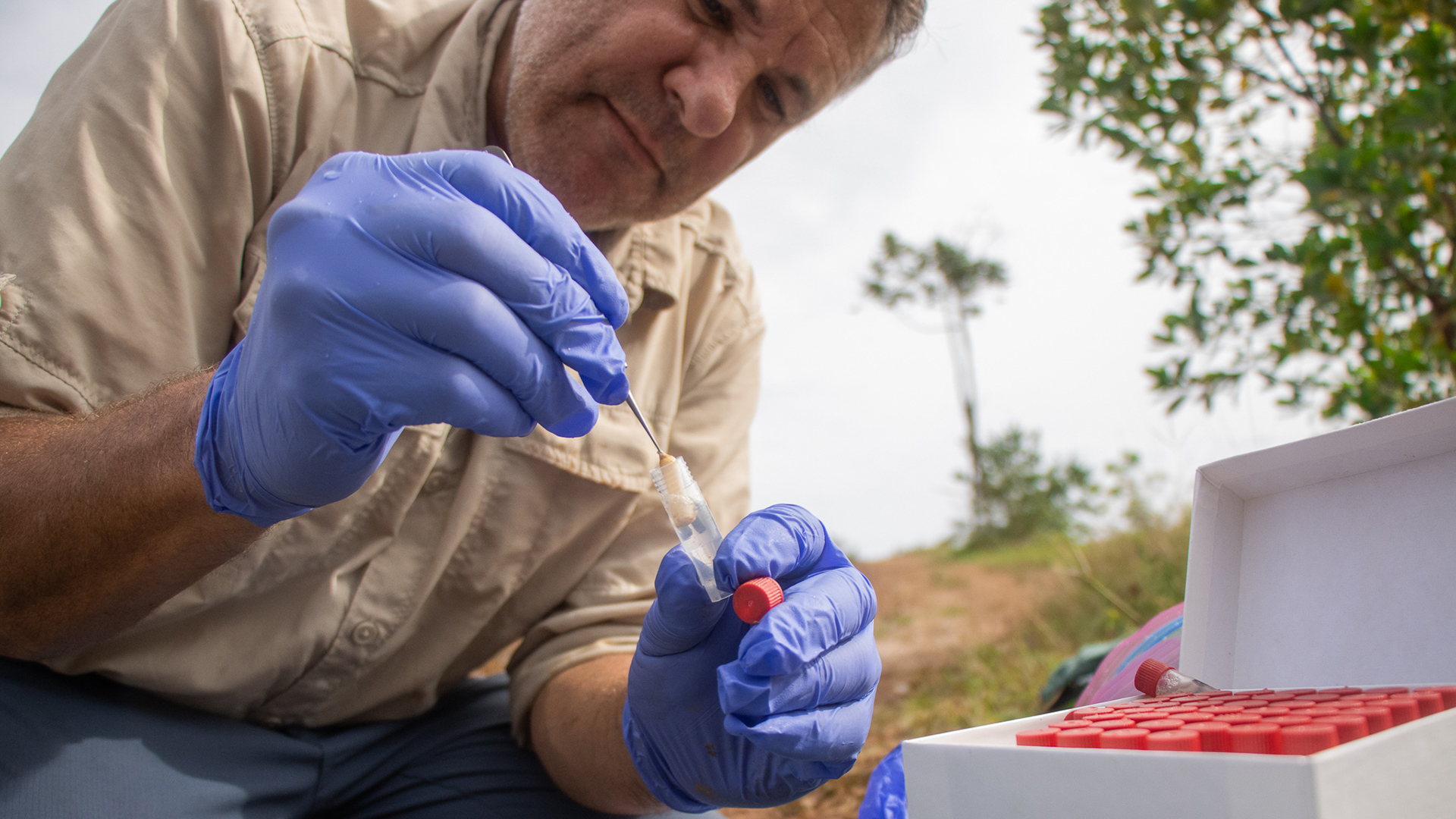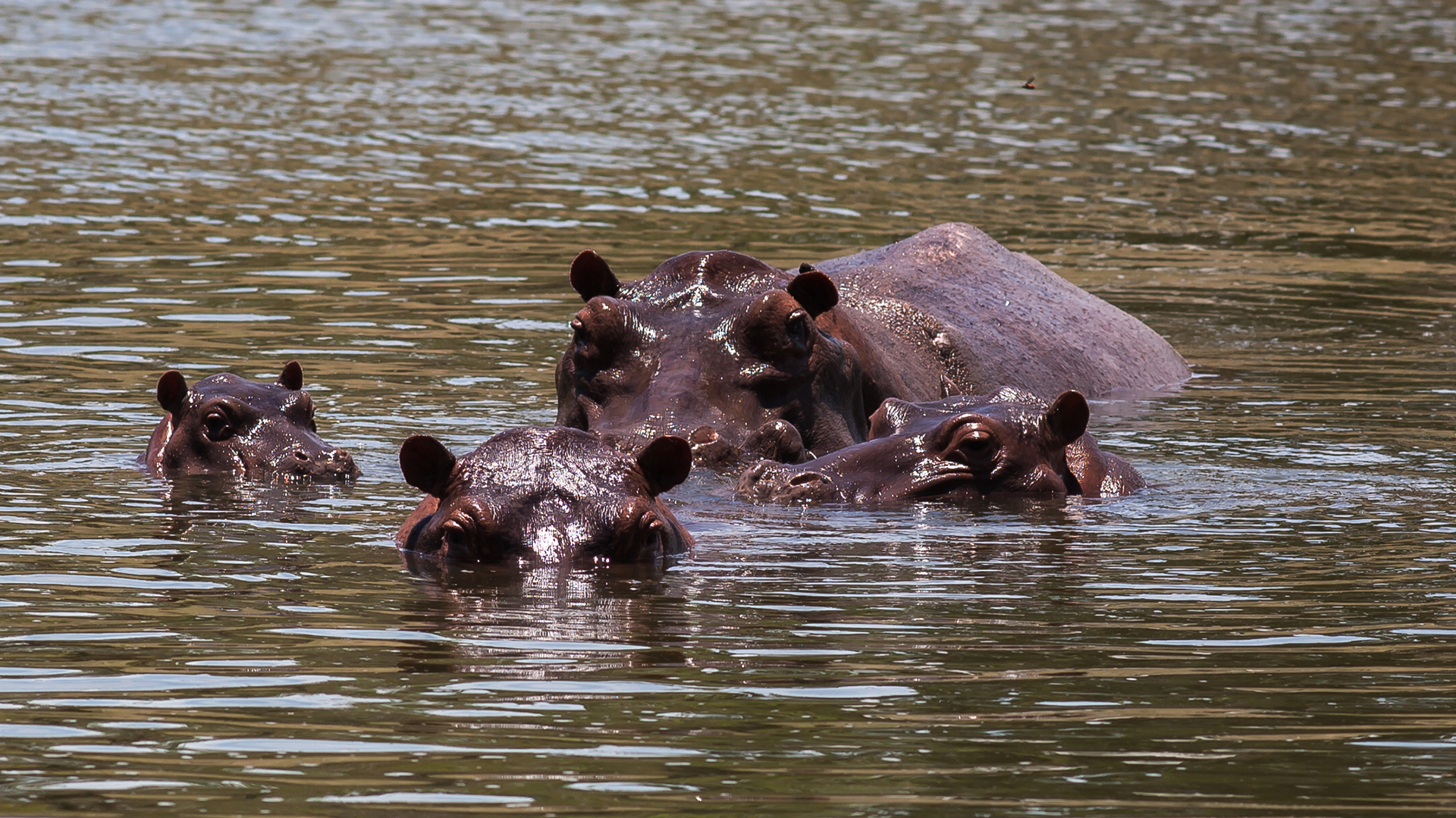Pablo Escobar's 'cocaine hippos' are being sterilized because the population is out of control
Four hippos escaped in 1993, and 80 now live in the wild near Escobar's former estate.

Wildlife officials in Colombia have begun sterilizing the so-called cocaine hippos that once belonged to the notorious drug lord Pablo Escobar. This measure will ensure that the hippo population doesn't keep growing, which could degrade river ecosystems and threaten native wildlife and people.
The hippo herd now includes an estimated 80 individuals, and they inhabit the marshy river networks near Medellín, Colombia, where Escobar once kept his Hacienda Nápoles estate and where he maintained a private zoo. Four hippos escaped from the zoo in 1993 after police killed Escobar, and the invasive animals, which were deemed too dangerous to capture, quickly adapted to their new home and have been breeding in the wild ever since, Live Science previously reported.
But while that might be a success story for the escaped hippos, it's been a major headache for Colombian officials, The Guardian reported. Rather than culling the fast-growing herd, biologists opted to sterilize the animals, and they began by giving doses of a contraceptive vaccine to 24 of the hippos, to render them infertile, according to The Guardian.
Related: Gallery: Evolution's most extreme mammals
Scientists with the Regional Autonomous Corporation of the Negro and Nare River Basins (CORNARE) used a vaccine called GonaCon, which the U.S. Department of Agriculture's (USDA) National Wildlife Research Center developed in the early 1990s as a contraceptive for deer, according to a USDA description of the drug.
The USDA donated 55 doses of the drug to CORNARE, which wildlife experts delivered via darts to two groups of hippos in Colombia's Magdalena Medio region, CORNARE representatives said in a statement. Over the next few months, the CORNARE team will continue to administer GonaCon to the rest of the hippos.
GonaCon works on both males and females by stimulating the production of antibodies that interfere with the production of sex hormones called gonadotropins, thereby decreasing sexual activity and inhibiting reproduction "as long as a sufficient level of antibody activity is present," according to the USDA. The vaccine lasts several years and has been used to control populations of deer and wild horses in the U.S., wild cattle in Hong Kong and kangaroos in Australia, according to CORNARE.
Sign up for the Live Science daily newsletter now
Get the world’s most fascinating discoveries delivered straight to your inbox.

GonaCon works on both males and females by stimulating the production of antibodies that interfere with the production of sex hormones called gonadotropins, thereby decreasing sexual activity and inhibiting reproduction "as long as a sufficient level of antibody activity is present," according to the USDA. The vaccine lasts several years and has been used to control populations of deer and wild horses in the U.S., wild cattle in Hong Kong and kangaroos in Australia, according to CORNARE.
Other than the Escobar hippos, these animals are found in the wild only in central and southern Africa, where they are native to 30 countries, according to the African Wildlife Foundation (AWF). There are two hippopotamus species: the common hippo (Hippopotamus amphibius) and the pygmy hippo (Choeropsis liberiensis).
The hippos in Colombia are common hippos, which can grow to be up to 17 feet (5 meters) long and may weigh as much as 10,000 pounds (4,500 kilograms), the AWF says.

Hippos are herbivorous; they spend most of their time wallowing in shallow water and emerge in the evening to graze, according to the San Diego Zoo. A single adult hippo consumes about 88 pounds (40 kg) of grass per day on average. Hippos also produce prodigious quantities of poo; in 2018, researchers found that a herd of about 4,000 hippos wallowing in the Mara River in Kenya pooped about 9.3 tons (8.4 metric tons) per day. In fact, the volume of hippo poop was so enormous that it was suffocating fish downstream, Live Science previously reported.
The presence of Escobar's hippos has already modified the ecosystem and displaced local wildlife, CORNARE officials said in the statement. Hippos can live to be 50 years old in the wild and have no natural predators in Colombia; over time, the environmental impact of all that breeding, eating and pooping will only increase, especially if the herd keeps growing. The bigger the hippo herd is, the greater the likelihood of run-ins with local fishers, and those encounters could lead to attacks against people, according to CORNARE.
Chemical sterilization is cheaper and far less dangerous than other options for hippo population control, such as culling or surgical castration. However, this is only the first stage of the vaccination process, as animals this size will likely require three doses of GonaCon to ensure their sterilization, CORNARE representatives said.
Originally published on Live Science.

Mindy Weisberger is an editor at Scholastic and a former Live Science channel editor and senior writer. She has reported on general science, covering climate change, paleontology, biology and space. Mindy studied film at Columbia University; prior to Live Science she produced, wrote and directed media for the American Museum of Natural History in New York City. Her videos about dinosaurs, astrophysics, biodiversity and evolution appear in museums and science centers worldwide, earning awards such as the CINE Golden Eagle and the Communicator Award of Excellence. Her writing has also appeared in Scientific American, The Washington Post and How It Works Magazine. Her book "Rise of the Zombie Bugs: The Surprising Science of Parasitic Mind Control" will be published in spring 2025 by Johns Hopkins University Press.










